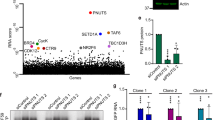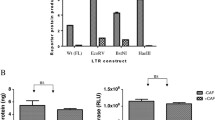Summary
Activation of protein kinase c (PKC) reduces transcription from the polymerase III (pol III)-transcribed adenovirus VA gene. Data presented here support a role for PKC in disrupting the formation of transcription-competent initiation complexes. The study used the plasmids VA and VA/EL (VA gene with a linker to distinguish its transcript from that of the VA gene) in in vitro assays to show that preincubation of either template for a minimum of 10 min before the activation of PKC did not result in PKC-induced repression of transcription. In contrast, under the same conditions, efficient transcription occurs from a preincubated template but not from a second template if it is added during or after the activation of PKC. Simultaneous preincubation of both VA and VA/EL resulted in efficient transcription from both templates. Rescue experiments confirm that PKC modifies a target within transcription factor B (TFIIIB) because phosphocellulose fractionation of whole-cell extracts that yield partially purified pol III transcription factor, TFIIIB, successfully rescues VA transcription from PKC-induced repression. Subsequent studies confirmed that the TATA box-binding protein (TBP), a constituent of TFIIB, substituted for the crude preparation of TFIIIB. These data support a conclusion that activation of PKC triggers a cascade that likely involves the sequestration or degradation of TBP, resulting in the disruption of the steps that leads to successful pol III transcription initiation.
Similar content being viewed by others
References
Cairns, C.; White, R. p53 is a general repressor of RNA polymerase III transcription: EMBO J. 17:3112–3123; 1998.
Chu, W.; Wang, Z.; Roeder, R.; Schmid, C. RNA polymerase III transcription repressed by RB through its interactions with TFIIIB and TFIIIC2. J. Biol. Chem. 272:14755–14761; 1997.
Culotta, T.; Wides, R. J.; Sollner-Webb, B. Eucaryotic transcription complexes are specifically associated in large sedimentable structures: rapid isolation of polymerase I, II, and III transcription factors. Mol. Cell. Biol. 5:1582–1590; 1995.
Geiduschek, E. P. Transcription by RNA polymerase III. Ann. Rev. Biochem. 57:873–914; 1988.
Geiduschek, E. P.; Kassavetis, G. The RNA polymerase III transcription apparatus. J. Mol. Biol. 310:1–26; 2001.
Herwig, S.; Strauss, M. The retinoblastoma protein: a master regulator of cell cycle, differentiation and apoptosis. Eur. J. Biochem. 246:581–601; 1997.
Hunt, T.; Karin, M. The regulation of transcription by phosphorylation. Cell 70:375–387; 1992.
Inostroza, J.; Mermelstein, F.; Ha, I.; Lane, W.; Reinberg, W. Drl, a TATA-binding protein-associated phosphoprotein and inhibitor of class II gene transcription, Cell 70:477–489; 1992.
James, C. B. L.; Carter, T. H. Activation of protein kinase c inhibits adenovirus VA gene transcription in vitro. J. Gen. Virol. 73:3133–3139; 1992.
Kassavetis, G.; Braun, B.; Nguyen, L.; Geiduschek, E. S. Cerevisiae TFIIIB is the transcription initiation factor proper of RNA polymerase III, while TFIIIA and TF IIIC are assembly factors. Cell 60:235–245; 1990.
Manley, J.; Fire, A.; Cano, A.; Sharp, P. DNA-dependent transcription of adenovirus genes in a soluble whole cell extract. Proc. Natl. Acad. Sci. USA 77:3855–3859; 1980.
Mital, R.; Kobayashi, R.; Hernandez, N. RNA polymerase III transcription from the human U6 and adenovirus type 2 VAI promoters has different requirements for BRF, a subunit in human TFIIIB. Mol. Cell. Biol. 16:7031–7042; 1996.
Samuels, M.; Fire, A.; Sharp, P. Separation and characterization of factors mediating accurate transcription by RNA polymerase II. J. Biol. Chem. 257:14419–14427; 1982.
Schramm, L.; Hernandez, N. Recruitment of RNA polymerase III to its target promoter, Genes Dev. 16:2593–2620; 2002.
Schramm, L.; Pendergrast, P.; Sun, Y.; Hernandez, N. Different human TFIIIB activities direct RNA polymerase III transcription from TATA-containing and TATA-less promoters. Genes Dev. 14:2650–2663; 2000.
Segall, J.; Matsui, T.; Roeder, R. G. Multiple factors are required for the accurate transcription of purified genes by RNA polymerase III. J. Biol. Chem. 255:11986–11991; 1980.
Sutcliffe, J.; Cairns, C.; McLees, A.; Allison, S.; Tosh, K.; White, R. RNA polymerase III transcription factor IIIB is a target for repression by pocket protein p107 and p130. Mol. Cell. Biol. 19:4255–4261; 1999.
White, R. J. Transcription factor TFIIIB: an important determinant of biosynthetic capacity that is targeted by tumor suppressors and transforming proteins (review). Int. J. Oncol. 12:741–748; 1998.
White, R.; Khoo, B.; Inostroza, J.; Reinberg, D.; Jackson, S. Differential regulation of RNA polymerase I, II, and III by the TBP-binding repressor Drl. Science 266:448–450; 1994.
White, R. J.; Rigby, P.; Jackson, S. The TATA-binding protein is a general transcription factor for RNA polymerase III. J. Cell Sci. 16 (Suppl.):1–7; 1992.
Xu, G.; Gai, Q.; James, C. B. L. Protein kinase c inhibits transcription from the RNA polymerase III promoter of the human c-myc gene. Cancer Lett. 123:199–205; 1998.
Author information
Authors and Affiliations
Rights and permissions
About this article
Cite this article
Shannon, T.E., James, C.B.L. Protein kinase C inhibits formation of va gene transcription initiation complex. In Vitro Cell.Dev.Biol.-Animal 39, 460–467 (2003). https://doi.org/10.1290/1543-706X(2003)039<0460:PKCIFO>2.0.CO;2
Received:
Accepted:
Issue Date:
DOI: https://doi.org/10.1290/1543-706X(2003)039<0460:PKCIFO>2.0.CO;2




